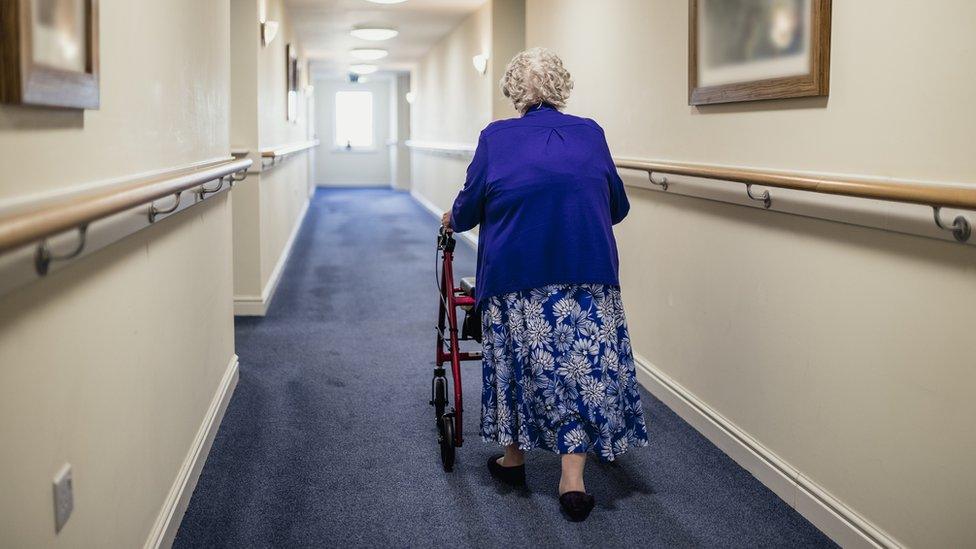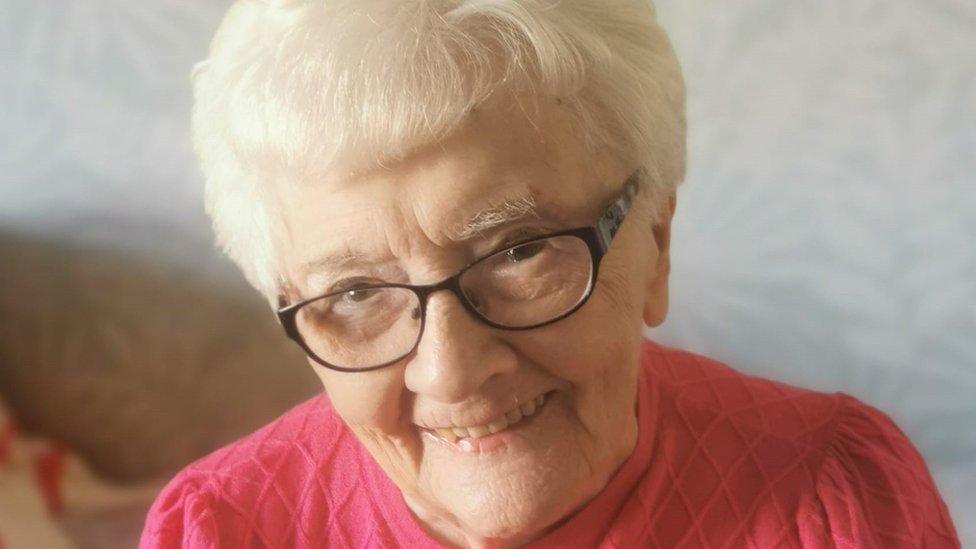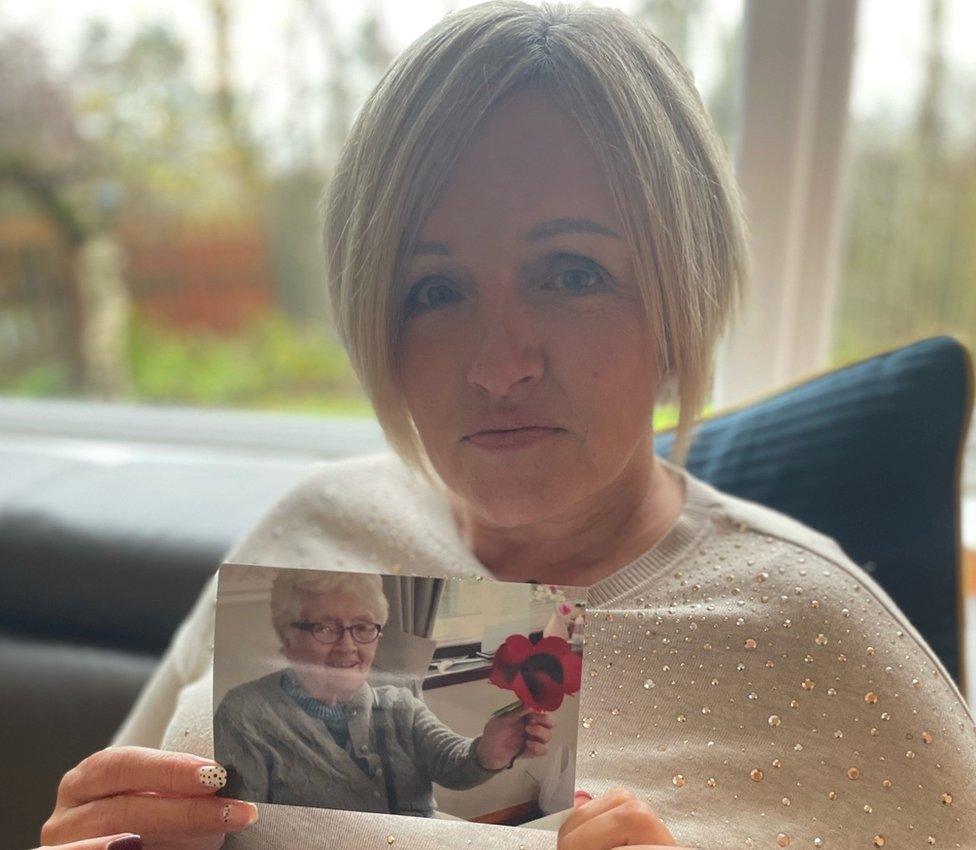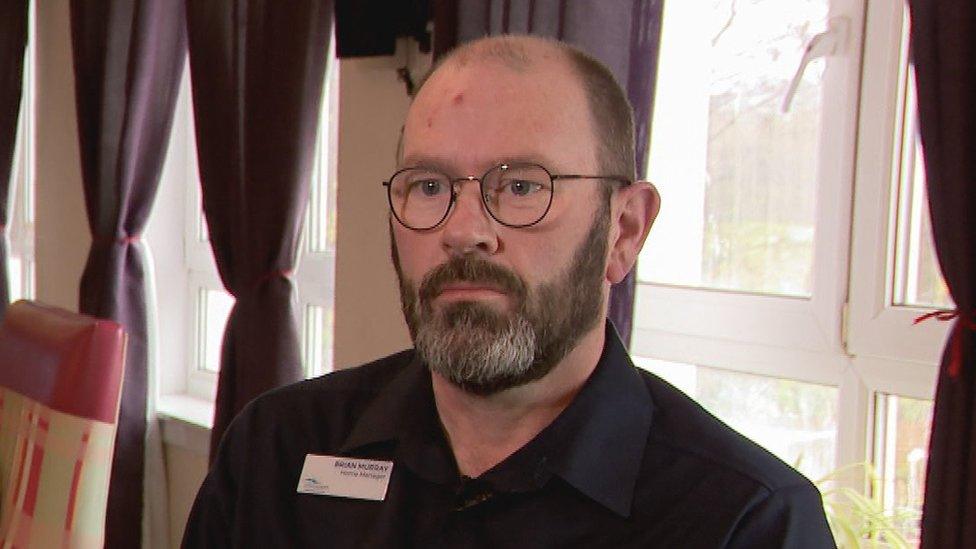Is a two-tier system developing in Scotland's residential care homes?
- Published

Relatives of care home residents say more must be done to address a growing price gap between those funding their own care places and those being paid for by councils.
It comes as campaigners say families are experiencing sharp rises in private care home fees.
Research compiled this year shows self-funding care home residents are now paying on average 40% more than those who are publicly-funded.
That compares with 24% a decade ago.
Meanwhile, a proposed National Care Service is currently the subject of a bill making its way through the Scottish Parliament.
'Why is she being penalised?'

Kathleen Harvey is 94 years old and was admitted to a care home last December after being diagnosed with Alzheimer's disease.
The grandmother - from Cumbernauld in Lanarkshire - worked as a bus conductor in Glasgow and was widowed in her late 40s.
While she was caring for her only child, Sheila, she used her savings to buy a council house under the Right to Buy scheme.
Her daughter Sheila Beattie told BBC Scotland: "She was adamant that she wanted to make sure my future was secure."
Because of that ownership, Kathleen had assets of more than £29,750 - meaning she is responsible for funding her own care home costs under the current rules.
The house was sold for £80,000 last year. Within the space of 2022, almost half of that money has been spent on her care home fees, which cost more than £1,200 a week.

Sheila Beattie says her mum Kathleen bought her council house to ensure her daughter had a roof over her head
Kathleen receives the statutory £308 for free personal and nursing care from the council towards her care, but Ms Beattie told BBC Scotland that her mother's fees increased by 11% in April.
She questioned why Kathleen's care costs much more than someone who is publicly-funded.
"If you compare two people, their income may be very similar but because of my mum's desire to put a roof over my head, why is she then being penalised?
How residential care is being funded
For the last 20 years, Scotland has been providing free personal and nursing care, including in residential homes.
How much that care is worth is determined by a cost model negotiated by Cosla - which represents local authorities administering care - and the private care companies that run the majority of homes in Scotland.
Different councils have different funding arrangements but the model sets out the maximum care homes can charge the local authority to care for someone wholly funded by the public.
In 2022, the maximum charge is £719 per week for residential care and £832 for those who also require nursing care.
Only those with assets or savings below £18,500 will be funded in this way.
For those with assets above £29,750, they are unable to claim and must fund their own place in a care home. However, they are still eligible for local authority payments towards their care totalling £308.
Data released by Public Health Scotland revealed that the average weekly cost for someone in publicly-funded residential care is now £856.
Meanwhile, self-funders pay on average £1,200 a week.
Average weekly charges for publicly-funded residents have grown by 52% since 2012. Self-funders have seen rises of 71%.
'They feel like they are being fleeced'

Scotland has around 30,000 care home residents - a third of whom are wholly self-funded.
Scottish Labour MSP Alex Rowley requested statistics on self-funders' costs after he was contacted by constituents complaining about growing fees in private care homes.
"They feel like nobody is there to protect them," he told BBC Scotland. "They feel like they are being fleeced.
"You have a situation where you have someone who has worked hard all their days, they've saved money all their days.
"The particular generation I'm talking about, they maybe bought their council house so have a bit of capital, so therefore it is deemed they have to self-fund when they go into care."
The Mid Scotland and Fife MSP believes any discussions on a new National Care Service should seek to address the imbalance between the two groups.
He said: "We have two rates. We have the rate the council will pay the care, then we have a rate that is so much higher that someone who is deemed to have to self-fund is being asked to pay."
'Inequity in the system'
Two thirds of care homes in Scotland are run by private firms.
A recent study by the Scottish Trade Unions Congress (STUC) claimed that privately-run homes saw more than double the amount of "leakage" - money spent of rent, interest and profits - compared with local authority-run homes.
However, care home owners say the money provided for publicly-funded care isn't enough.
Karen Hedge, deputy CEO of Scottish Care, which represents care homes, said the Scottish Government must step in to "level up the inequities in the system".
She told BBC Scotland: "The challenge that we have really, is that council funding has to catch up with the true cost of care.
"About a decade ago, a cost model was agreed by COSLA and care providers and the purpose of that was to establish what the true cost of care was.
"What we haven't seen is the cost model catch up to incorporate those changes in the type of care and support that is delivered."
'Get the funding levels right'

Brian Murray is co-owner and manager of Abbey Court care home in Easterhouse, Glasgow.
The majority of its residents are publicly-funded but the home is adding an extension to double its intake.
With rises in the cost of living, he said self-funders are ultimately making up a shortfall caused by inadequate council funding.
"It is simply because there isn't enough money being given by the government or your local councils to cover the costs of running a care home," he told BBC Scotland.
"The current rate, if you break it down, you are looking at £4.05 per hour for each resident in a home. It is £5 an hour for nursing care.
"There should be significant increases. In the four years since we opened, the amount per week has went up by less than £200 per resident per week, whereas costs are absolutely skyrocketing."
The Scottish government said the amount paid by self-funders for care is a "contractual matter" between the resident and the home.
In a statement, a spokesman said it "recognises the cost of care can be high for residents self-funding their own care".
The statement continued: "This is why we have increased the Free Personal and Nursing Care rates by 18.3% over the last two years.
"Self-funders who are assessed as requiring it are entitled to receive a Free Personal Care payment. A nursing care element is also available."